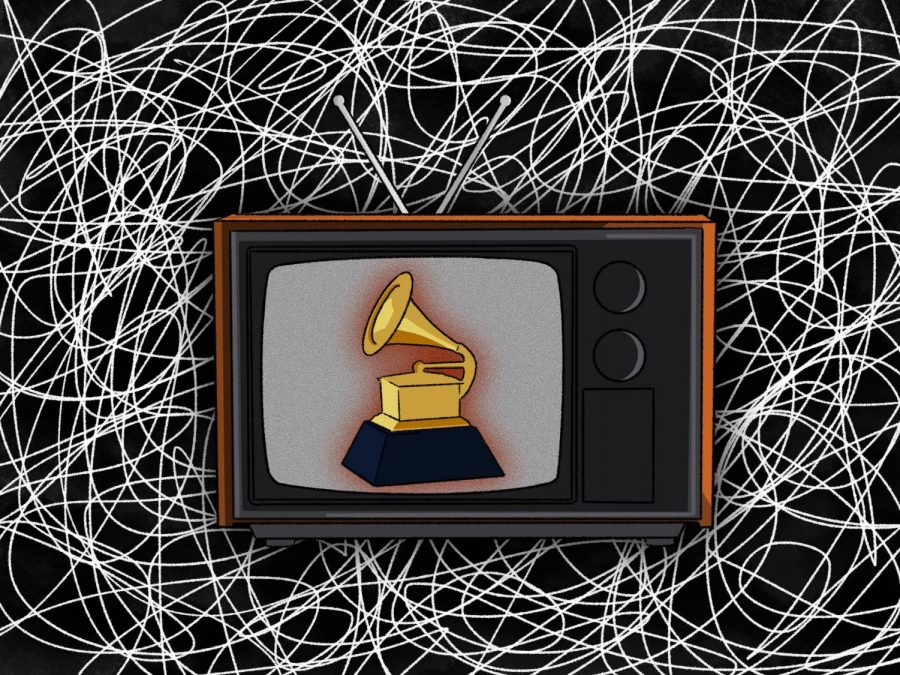It was ethereal.
It started on a close frame – lit with a deep cerulean blue, Taylor Swift’s blonde hair looked almost black. As the camera pulled away, we saw that she was laying on the grassy roof of a set that looked like a cottage. The background of a nighttime forest was dotted with floating lights, almost like fairies, drifting between digital trunks of trees and vines. Swift’s “folklore” medley saw her down off of the roof, into a warmly lit cottage, and out the front door onto a lawn with glowing orbs like the background behind her.
In her acceptance speech for Album of the Year, she thanked fans for joining her in this imaginary world she and producers Jack Antonoff and Aaron Dessner had created.
The 2021 GRAMMY Awards, hosted by Trevor Noah, were somewhat like a reflection of the last year. For many people around the world and in America, 2020 was a time of deep self-reflection, heartache and frustration. If art is a reflection of a culture, an experience, then watching the Grammys this year was like a glint from a shard of glass – characterized by brokenness, but capturing a light only made possible by the break.
Oxford Dictionary defines escapism as “the tendency to seek distraction and relief from unpleasant realities, especially by seeking entertainment or engaging in fantasy.” Swift perhaps most explicitly characterized the escapism that was encoded into nearly every performance and nominee this year, but she was far from the only to dig her heels into a world far different than the one we live in.
She wasn’t the only one.
Bruno Mars and Anderson .Paak debuted their new project Silk Sonic.
Billie Eilish walked away with her second consecutive Record of the Year win.
Dua Lipa’s “Future Nostalgia” won Best Pop Album.
Megan Thee Stallion took home three of the four awards she was nominated for.
Cardi B debuted “WAP,” Bad Bunny and BTS were featured performers in languages other than English, DaBaby performed and talked about his “pretty smile.”
It shaped up to be about what one has come to expect from all of the artists presented— in all of their diverse backgrounds. What tied them all together was the same theme of being ready to escape the era, even the world, that we’re living in.
What cut them up was the harsh reality that came into play before and immediately following every performance (because let’s be honest— the Grammys telecast isn’t so much about the awards anymore). It was packaged and delivered straight to the face in a smattering of applause from only the other performing artists, if the performance was live at all.
It would be remiss not to mention the one very grounding exception to this theme— Lil Baby’s performance titled “The Bigger Picture,” which started on the street with a staged police shooting of a black man and featured activist Tamika Mallory directly calling out President Joe Biden, saying, “we don’t need allies. We need accomplices.”
The powerful (and well-choreographed) performance was, however, the only one of its kind on Grammys night. But that doesn’t make it any less of a pinpoint reaction to the world and mindset of America of 2020.
The Grammys, which celebrate the achievements of musical artists (both commercial and artistic) have long been a hallmark of the music industry and a glimpse into the mindset of a large number of music consumers annually. It’s no secret that many wanted to get away, and that was on full display.
Take Taylor Swift: she wrote, recorded, produced and released not one but two albums while quarantined, both mostly separate from her typical autobiographical approach. The visual component of ‘folklore’, the album nominated for four awards and cinched her the biggest of her nominations, included black-and-white imagery and naturalism. Her songs reflected the characters she wrote, stories she invented— a hard left turn from the self-exposing style she is known for.
Silk Sonic, the project headed by Bruno Mars and Anderson .Paak, donned matching rust orange suits complete with palazzo pants and large tinted sunglasses, harking back to an era of peace and love. America in the 1970s was plagued with a new distrust in the government, propelled by the Vietnam War and Watergate. It’s also known as an era of the hippie— bright colors and psychedelic drugs, peace signs and flower crowns for everyone. It was the decade when “Rumors” by Fleetwood Mac, “Songs in the Key of Love” by Stevie Wonder and the soundtrack to “Saturday Night Fever” all won Album of the Year. Silk Sonic’s instant popularity and positive reception has much to do with the actual musicianship (its one single so far is truly sonically silky), but also because it is a reminder of a different time— one the artists are too young to know (Mars and Paak were born in 1985 and 1986, respectively).
So, of the headliners, Swift created a fantasy cottagecore world, Silk Sonic brought everyone back to an era they weren’t even alive for, Harry Styles dressed like Ashley Tisdale, Eilish won the night’s top award for a song about a dream she had, Megan Thee Stallion even performed songs off of her debut album with a big band, classic 1940s musical influence. What does that say about where we are? Can’t a good performance pull influence without meaning we’re all trying to get away?
The answer to the second question is yes, of course. A Grammy performance is a big deal for many of the artists chosen and, naturally, many of them put together a unique show to keep their radio singles fresh. However, it’s undeniable that the last year has forced many Americans to come face-to-face with their circumstances when a lot of the noise was cut out due to lockdowns and quarantines.
Art, especially music, inundates so much of the culture. The 2021 Grammys celebrated that— a welcome escape in the midst of a historic year.










